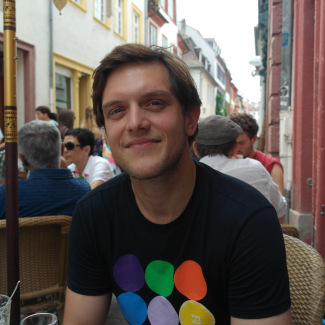
1. The European Union has often been criticized as being distant and bureaucratic. What room is there for young people in the European project?
One of the things that is in the DNA of the Young European Federalists is that we are fundamentally optimistic and while we are often impatient, we do not forget to take a long view and reject the sort of cynicism that suggest that young citizens have no voice and decisions are taken in a distant and unreachable place. True, the EU is not a perfect system of governance. True, it is sometimes exasperatingly bureaucratic (one of the pleasures of being JEF President is that occasionally the Commission requests hand-written letters in blue ink). And yet, the EU is the best system of supranational governance the world has known.
The fact that the EU is today significantly more democratic, inclusive and accessible than it has been ten or thirty years ago is not least the result of effective advocacy from youth organisations. One example is the Structured Dialogue of the European Commission to which JEF has been actively contributing during the past years. So, yes there is room for young people to get involved and, yes, we have an impact on EU policy.
The real dividing line, however, is no longer between young and old but between the part of society that tends to be mobile, flexible, multi-lingual, highly educated and tends to be very capable in pushing for its interest and piorities and the part of soeicty that is more rooted in one area, identifies locally rather than European and less directly benefits from the European project. There is no simple answer as to how the latter can be re-engaged in a pan-European democratic process, but this will be the crucial challenge for the EU in the next years as well as an important aspect to reflect on for JEF.
2. What are the areas in which the Union needs to extend its cooperation immediately and what are the areas in which it needs to do so over the longer term?
One important issue that needs to be tackled with high urgency is the incomplete architecture of the Eurozone. With its current institutional setup the Eurozone is simply not well prepared to withstand economic shocks and turbulances that might occur at any time. A monetary union without any solidarity mechanisms will not be able to survive in the long run.
This does not mean we need permanent fiscal transfers, but it means that there must be policies to counter asymmetric economic shocks, for example a European Unemployment Benefit (Re-)Insurance system for the Eurozone. This must go hand in hand with increased credibility of sensible fiscal rules. President Macron has made important proposals for this pair of solidarity and responsibility in the Eurozone and these need to be debated in the next year.
A second area where European solutions are needed urgently is the field of a true European migration policy based on the respect for human rights. The current situation, largely relying on the dubious Turkey deal, is not sustainable and does not represent the values of the European Union. Where no agreement between the 27 can be reached with regard to the distribution of migrants, some Member States will have to move ahead. Additionally, the benefits for and treatment of migrants needs to be harmonised across Member States and ideally be financed through the European budget. A common European Border Agency, accountable to the European Parliament, should be established.
The EU must also become more ambitious with regard to common minium social and taxation standards across the Union to regain trust and support from citizens.
Over the longer term the EU should act on the broad support amongst European citizens for a common European Foreign Policy and common European defense policies, leading to a European army. The EU should also continue an ambitious policy on enlargement, given substantial support to countries aspiring EU membership and granting a clear membership perspective to countries of the Eastern Neighbourhood. There is no better support for stability and democratic development in the Western Balkans and the Eastern Neighbourhood than through ambitious, honest and consistent enlargement policies.
3. What is the most radically federalist position you take, in comparison with most pro-Europeans?
I am not sure there are degrees of federalism, but what distinguishes my federalist position from other pro-Europeans is that I neither believe in the sustainability of the status quo of the Union nor do believe that a European nationalism should be created. Federalism is a principle for democratic governance temphasizesises the dignity of the individual and value of pluralism.
As such federalism is all about overcoming nationalism and allowing for diversity while allowing for the definition of policies in the pan-European interest it is the ideal model for European integration. Perhaps my most radical position is that I think a European federalist must also support world federalism (of course in a different timeframe) to remain intellectually consistent.
4. Should JEF become more politically involved, actively pushing for a federalist agenda during the next European elections in 2019, or should it move toward a more social role in establishing networks of likeminded Europeans across the Member States?
I do not think those options are mutually exclusive. A federalist agenda for the European elections must certainly go beyond a simple call to vote. After many years of paralysis there is finallmuch-needededed momentum for real and fundamental change with a French president calling for the re-foundation of the Union.
We cannot let this opportunity slip. This requires that the next European elections result in a clear majority of Federalists in the European Parliament, committed to carry forward the Parliament’s ambitious position as established in the Verhofstadt report. JEF cannot be a bystander in this campaign but must contribute to the best of our abilities to convince citizens and candidates to support our positions. In the run up to the elections we have a role to play in making sure the Spitzenkandidat-modell is sustained and we must be a loud voice for the creation of transnational lists, making use of the vacated British seats.
It is clear that for a succesful campaign we have to help build capacity in our sections and we need allies and partners across Europe. We are already succesful in building pro-European coalitions and network between partner organisations, such as in the context of our #DontTouchMySchengen with partners from the European Youth Forum, the Erasmus Student Network, AEGEE and the political party youth organisations or for the March for Europe. We need to build on this work to create a broad support across the European democratic civil society for positive change in Europe.
5. What answer can the EU, and by extension JEF, give to the many movements for independence that we can see springing up, the most obvious example being Catalonia? Most of these movements definitely want to continue being part of the EU.
There is no one answer that fits for all cases of regionalism in Europe. European federalism can in so far be helpful as it strives to limit the competences and role of the nation state to the benefit of granting more powers to the European level and the regional and local level where possible. Federalism as a school of thought also emphasises the value of doversity and plurality and therefore allows for political solutions that reduce the need to create nation states for every language and cultural community. As federalists we believe that nationality is not and should not be the defining factor for political peferences.
At the same time, where secessionist movements are not the expression of an exclusivist and nativist nationalism and a sustained desire of the population exists to be independent from the bigger unit and this desire cannot be met by granting enhanced autonomy, there is no reason why the EU or JEF should oppose such movements as long as their proponents adhere to the rule of law. I am much more sceptical with regard to secessionist movements that focus mainly on the economic advantages of indepence (such as the Lega Nord).
6. It can be said that young people have the most to gain or lose during every election, as their lives will be impacted for the longest period of time by any choice. How will Europe and JEF look in two years?
For the next two years, I see three main priorities for JEF Europe: (1) We need to use the political momentum at the best of our abilities, (2) we should further improve and professionalise our internal governance and (3) we need to maintain the sustainability of our organisation by supporting smaller sections more effectively. It is important to set ambitious but realistic goals. Building on our work over the past 4 years we are now at the point really to make a step up as an organisation. We have introduced new governance structures for the board, with less ad-hoc decision-making and we are less frequently re-inventing the wheel.
We have better knowledge management systems, more funding and more staff, we are more transparent and we have introduced long-term planning for the organisation with a 4-year strategy and one year working plans. The next two years will be about making this level the new norm and making some important changes to our internal structures to handle the increased workload on the board and the secretariat. That means primarily that we need to make steps to the introduction of a full-time board with a full-time President as the first step. It also means that we need to find ways to involve directly-elected FC members more actively in the work of JEF Europe.
Politically, has become a significantly more important actor in Brussels as we had set as a goal at the congresses four and two years ago. With the ongoing debate about the future of the EU, initiated at the Rome summit and invigorated by President Macron, this is not the time that counts. During the next two years we have the responsibility to push the European reform agenda as much as we can and we have to design and carry out an impactful and inspiring campaign for the European elections.
There is also a role to play for JEF in the citizen conventions suggested by Macron. Finally, I hope that JEF will have restored sustainable growth in membership across all sections. For this a strong priority of the next mandate must be on providing as much support as possible for ailing sections and providing more and more easily accessible capacity building trainings as well as starting to build up a pool of trainers in JEF Europe.
You can read more about Christopher Glück here.


Follow the comments: |
|
